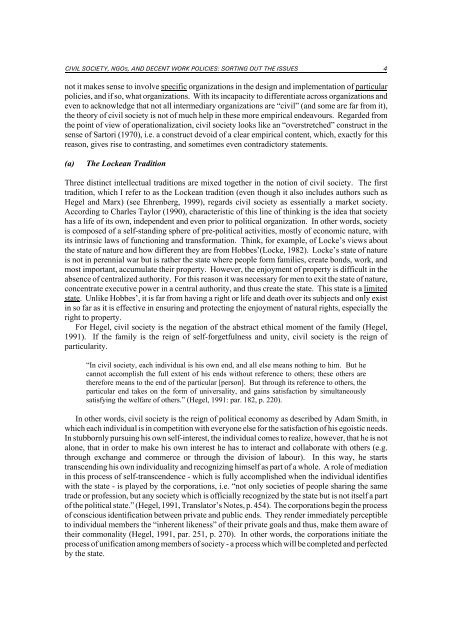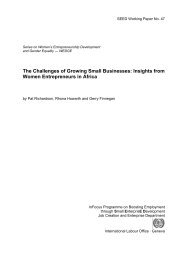Civil Society, NGOs, and Decent Work Policies: Sorting out the Issues
Civil Society, NGOs, and Decent Work Policies: Sorting out the Issues
Civil Society, NGOs, and Decent Work Policies: Sorting out the Issues
Create successful ePaper yourself
Turn your PDF publications into a flip-book with our unique Google optimized e-Paper software.
CIVIL SOCIETY, NGOS, AND DECENT WORK POLICIES: SORTING OUT THE ISSUES 4<br />
not it makes sense to involve specific organizations in <strong>the</strong> design <strong>and</strong> implementation of particular<br />
policies, <strong>and</strong> if so, what organizations. With its incapacity to differentiate across organizations <strong>and</strong><br />
even to acknowledge that not all intermediary organizations are “civil” (<strong>and</strong> some are far from it),<br />
<strong>the</strong> <strong>the</strong>ory of civil society is not of much help in <strong>the</strong>se more empirical endeavours. Regarded from<br />
<strong>the</strong> point of view of operationalization, civil society looks like an “overstretched” construct in <strong>the</strong><br />
sense of Sartori (1970), i.e. a construct devoid of a clear empirical content, which, exactly for this<br />
reason, gives rise to contrasting, <strong>and</strong> sometimes even contradictory statements.<br />
(a)<br />
The Lockean Tradition<br />
Three distinct intellectual traditions are mixed toge<strong>the</strong>r in <strong>the</strong> notion of civil society. The first<br />
tradition, which I refer to as <strong>the</strong> Lockean tradition (even though it also includes authors such as<br />
Hegel <strong>and</strong> Marx) (see Ehrenberg, 1999), regards civil society as essentially a market society.<br />
According to Charles Taylor (1990), characteristic of this line of thinking is <strong>the</strong> idea that society<br />
has a life of its own, independent <strong>and</strong> even prior to political organization. In o<strong>the</strong>r words, society<br />
is composed of a self-st<strong>and</strong>ing sphere of pre-political activities, mostly of economic nature, with<br />
its intrinsic laws of functioning <strong>and</strong> transformation. Think, for example, of Locke’s views ab<strong>out</strong><br />
<strong>the</strong> state of nature <strong>and</strong> how different <strong>the</strong>y are from Hobbes’(Locke, 1982). Locke’s state of nature<br />
is not in perennial war but is ra<strong>the</strong>r <strong>the</strong> state where people form families, create bonds, work, <strong>and</strong><br />
most important, accumulate <strong>the</strong>ir property. However, <strong>the</strong> enjoyment of property is difficult in <strong>the</strong><br />
absence of centralized authority. For this reason it was necessary for men to exit <strong>the</strong> state of nature,<br />
concentrate executive power in a central authority, <strong>and</strong> thus create <strong>the</strong> state. This state is a limited<br />
state. Unlike Hobbes’, it is far from having a right or life <strong>and</strong> death over its subjects <strong>and</strong> only exist<br />
in so far as it is effective in ensuring <strong>and</strong> protecting <strong>the</strong> enjoyment of natural rights, especially <strong>the</strong><br />
right to property.<br />
For Hegel, civil society is <strong>the</strong> negation of <strong>the</strong> abstract ethical moment of <strong>the</strong> family (Hegel,<br />
1991). If <strong>the</strong> family is <strong>the</strong> reign of self-forgetfulness <strong>and</strong> unity, civil society is <strong>the</strong> reign of<br />
particularity.<br />
“In civil society, each individual is his own end, <strong>and</strong> all else means nothing to him. But he<br />
cannot accomplish <strong>the</strong> full extent of his ends with<strong>out</strong> reference to o<strong>the</strong>rs; <strong>the</strong>se o<strong>the</strong>rs are<br />
<strong>the</strong>refore means to <strong>the</strong> end of <strong>the</strong> particular [person]. But through its reference to o<strong>the</strong>rs, <strong>the</strong><br />
particular end takes on <strong>the</strong> form of universality, <strong>and</strong> gains satisfaction by simultaneously<br />
satisfying <strong>the</strong> welfare of o<strong>the</strong>rs.” (Hegel, 1991: par. 182, p. 220).<br />
In o<strong>the</strong>r words, civil society is <strong>the</strong> reign of political economy as described by Adam Smith, in<br />
which each individual is in competition with everyone else for <strong>the</strong> satisfaction of his egoistic needs.<br />
In stubbornly pursuing his own self-interest, <strong>the</strong> individual comes to realize, however, that he is not<br />
alone, that in order to make his own interest he has to interact <strong>and</strong> collaborate with o<strong>the</strong>rs (e.g.<br />
through exchange <strong>and</strong> commerce or through <strong>the</strong> division of labour). In this way, he starts<br />
transcending his own individuality <strong>and</strong> recognizing himself as part of a whole. A role of mediation<br />
in this process of self-transcendence - which is fully accomplished when <strong>the</strong> individual identifies<br />
with <strong>the</strong> state - is played by <strong>the</strong> corporations, i.e. “not only societies of people sharing <strong>the</strong> same<br />
trade or profession, but any society which is officially recognized by <strong>the</strong> state but is not itself a part<br />
of <strong>the</strong> political state.” (Hegel, 1991, Translator’s Notes, p. 454). The corporations begin <strong>the</strong> process<br />
of conscious identification between private <strong>and</strong> public ends. They render immediately perceptible<br />
to individual members <strong>the</strong> “inherent likeness” of <strong>the</strong>ir private goals <strong>and</strong> thus, make <strong>the</strong>m aware of<br />
<strong>the</strong>ir commonality (Hegel, 1991, par. 251, p. 270). In o<strong>the</strong>r words, <strong>the</strong> corporations initiate <strong>the</strong><br />
process of unification among members of society - a process which will be completed <strong>and</strong> perfected<br />
by <strong>the</strong> state.
















